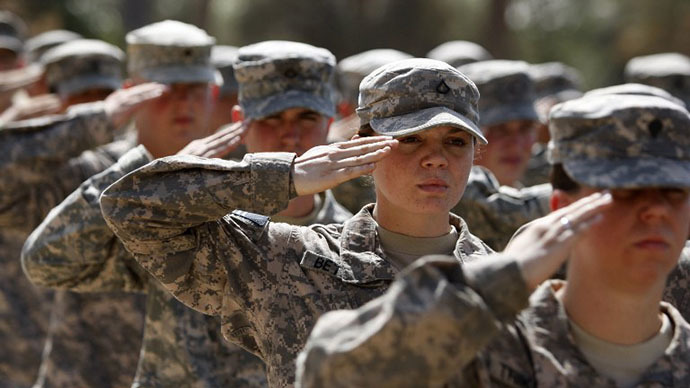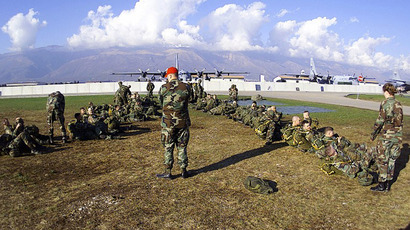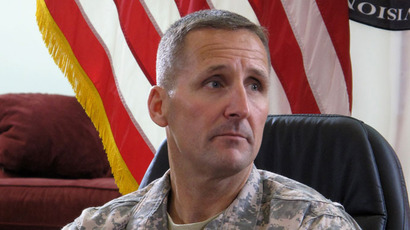Reported sexual assaults in US military jumped by 50% in 2013

Reported sexual assaults in the US military increased by over 50 percent in 2013, new data reveals. The boost punctuates a year filled with damning disclosures of a culture that has failed to protect the enlisted from systemic levels of sexual violence.
Data obtained by AP shows there were more than 5,000 sexual assault reports during the 2013 fiscal year, which ended on Sept. 30. By contrast, there were 3,374 incidents reported in 2012.
Of the total reports in 2013, around 10 percent involved incidents that happened before the victim was officially in the military - up from 4 percent in 2012. The increase in cases has led military officials to suggest there is more confidence among service members in reporting incidents of sexual assault than in the past.
"Given the multiple data points, we assess that this is more reporting," said Col. Alan R. Metzler, deputy director of the Pentagon's sexual assault prevention and response office, according to AP. Metzler said that more victims are stepping up to make official complaints instead of simply seeking medical care while avoiding formal accusations.
Pentagon officials announced in May that sexual assault incidents have increased by 35 percent between 2010 and 2012, bringing the annual total to 26,000 cases of some type of unwanted sexual contact or sexual assault last year. The results came via an anonymous survey.
The Department of Veteran Affairs also found that 85,000 US veterans received medical treatment for sex abuse trauma last year, which indicates that the effects of assault have far-reaching consequences, both financially and emotionally.
In addition to the daunting numbers of abuse, high-profile assaults and arrests have spurred Congress to address the military justice system that the Pentagon relies on for enlisted members to report incidents. A series of emotional public hearings on the subject were held, in which military brass was castigated for the abusive culture. Service chiefs conceded that they had failed, with one stating that sexual violence was "like a cancer" in the military.
The National Defense Authorization Act of 2014, passed by Congress this month and signed Thursday by President Barack Obama, includes reform measures to the reporting process and increased legal protections for those that come forward. For example, the new protocol strips military commanders of their ability to overturn jury convictions. New rules also demand a civilian review if a commander declines to prosecute a case. Finally, the reforms require that any individual convicted of sexual assault face a dishonorable discharge or immediate dismissal.
Major incidents among military commanders pushed the measure to passage. Yet the legislation notably left out a proposal by Sen. Kirsten Gillibrand (D-NY) that stripped the usual chain of command of the ability to legislate assault reports, thereby offering victims and independent route to accuse an offender. Gillibrand’s measure was fiercely opposed by the Pentagon and many in Congress.
In May, Air Force Lt. Col. Jeffrey Krusinski was arrested for drunkenly groping a woman. Krusinski was in charge of sexual abuse prevention, which made the case more disgraceful for the military than most.
Sgt. 1st Class Gregory McQueen, who was responsible for overseeing sexual assault prevention at Ford Hood, came under investigation for sexual assault in May. McQueen is facing allegations including the maltreatment of subordinates and running a prostitution ring.
In addition, Lt. Col. Darin Haas, the manager of Fort Campbell’s sexual harassment prevention office, was fired from his post and arrested on charges of violating an order of protection and stalking his ex-wife.
The new data shows that the increase in reports across all branches of the military range from 45 percent in the Air Force to a high of 86 percent in the Marines. The Navy saw a 46 percent jump in reports, while the largest service, the Army, saw a 50 percent spike.
The Navy’s sexual assault program director, Jill Loftus, said that increased reporting can also suggest that more service members are understanding which behaviors constitute assault or harassment based on successful training programs employed to combat violent behavior.
Loftus countered that the Navy’s surveys are not indicating an increase in incidents, but that more people are comfortable with coming forward. "More likely, we have people who understand what sexual assault is," she said.
Moving forward, military officials told AP that the goal for 2014 is to continue encouraging the reporting of incidents while lowering the total number of assaults and sexual harassment cases. Services have begun to implement new programs aimed at deterring incidents before they happen.
For instance, a Navy pilot program in Illinois is working with local hotels and bars in an attempt to curb alcohol consumption by sailors. In addition, members of the Navy have been told to intervene should they see fellow sailors involved in unacceptable behavior.
Other programs include curbing hours of alcohol sales and employing patrols of service members to watch for troops who may need help or are causing trouble.
Loftus said that some commanders are making their courts-martial more public, using publicized notices of sexual assaults and holding cases on open parade fields so that onlookers can watch.














